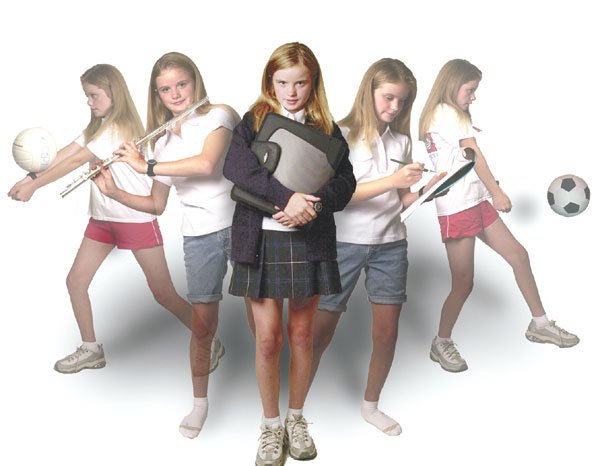Changes in America’s social order are producing a generation of
over-worked, over-stressed kids, according to national media
reports, but are South Valley kids really feeling strained?
Open a magazine or newspaper, and you’re likely to run across one of the latest hot topics: the overstressing of the nation’s youth.
To read some of these stories, it would seem that every child in the United States was preparing a college resume by sixth grade, shuttling rapidly between seven different after-school activities and still finding time to do homework. But according to local principals and counselors, only a small percentage of students really are overscheduled.
“I worry about that with my own kids because I do have them in a lot of things, but I do think parents are pretty good about knowing when enough is enough,” said Tammy Gabel, principal of Antonio Del Buono Elementary School in Gilroy. “My general sense is that (parents) seem to know (when a schedule becomes too much for their children).”
Yvette DeView, who acts as the principal and one of the teachers at Cienega School in Hollister, agreed.
“I would say some children are overscheduled, but it just depends on the family,” said DeView. “I don’t see it all the time.”
For the rest of the country, perhaps it’s a generational nostalgia for the days before AYSO and play dates, or a recognition that the frantic pace of the modern adult world has infiltrated that of the nation’s youth, but suddenly news outlets are making a fuss. Yet, while the lives of the nation’s children may be more scheduled than they were, say, 20 years ago, today’s kids can choose to participate in club teams and after-school groups based on a wide array of interests.
“You’ve probably known people who could do 10 things at once without breaking a sweat and people who couldn’t do one without being on the verge of tears, so I think if you’re going to look at stress levels, it depends on the motivation (the kids have to do these activities),” said Kara Armijo, counselor at Brownell Academy Middle School in Gilroy. “If there are seven activities that the kids love, I’m sure they’ll find a way. If it’s more of a parent’s reason, I guess it would depend on how much they want to please their parents and how much they enjoy it themselves.”
If a child no longer enjoys one or more of the activities he or she is involved in, or if the activities begin to hamper the child’s ability to get enough sleep or to turn schoolwork in, parents may want to consider helping their child to cut back on activities, Armijo said. On the other hand, she said, removing too many activities from their schedules could leave them bored.
But some experts do see a problem, and find that boredom may be underrated. Never-ending demands on children’s schedules may actually be hurting their chances for success later on, stifling their imaginations and delaying or stunting the development of self-awareness, according to Diane Ehrensaft, a developmental and clinical psychologist and professor at The Wright Institute in Berkeley, Calif.
Middle-class children are so overscheduled today, Ehrensaft said, that they have almost no “nothing time,” or time to call on their own resources and creativity. A certain amount of boredom is involved in developing creativity, because children must learn to rely on themselves for entertainment, but she feels that with too much structured play time, Americans are sacrificing creative children for “Renaissance children” who are competitive in all areas.
It’s an idea that’s not without merit. Right now, the older end of this generation is beginning to enter the workplace, and while they’re great team players, analysts don’t see leaders among them, according to researchers like Dr. Mel Levine, a prominent pediatrician and professor at the University of North Carolina. Today’s kids have grown up with corporate culture and “group think,” he says, pressuring their peers to excel, and the statistics show it. Teen smoking, pregnancy and violent crime are all down considerably, but qualities like leadership and innovation are lacking, he said.
Levine has maintained that endless jostling between music lessons, specialty classes and sports practices has left kids dependent on adults telling them what to do, and that this makes them shaky job prospects. Having grown up in a society where every kid gets a trophy for something, he’s said, they expect to achieve success, recognition and promotion instantly. Instead, he fears, they’ll be in for a nasty shock.
But parents aren’t pushing their children to be mindless drones, according to Psychology Today writer David Elkins. They’re well intentioned, and many believe they’re giving their children a better life than they enjoyed growing up.
In the pursuit of extracurricular activities, here are a few of the things students ages 3 to 12 gave up between 1981 and 1997, according to national surveys conducted by the Survey Research Center at the University of Michigan:
n 12 hours of free time
n 3 hours of playtime
n 50 percent of their unstructured outdoor activities such as walking, hiking or camping
n 10 percent of their family mealtime
n 40 percent of their time spent in religious participation
n 100 percent of their household conversations held for conversation’s sake
At the same time, the surveys found that time spent in structured sports doubled over the same time period, as did time spent studying. Passive, spectator leisure – time spent watching things like a brother or sister’s basketball game in person – increased five fold, from 30 minutes per week in 1981 to more than three hours per week in 1997.
These are troubling figures when considered alongside research by other leading institutions. The president’s economic advisory council found, in the nation’s largest federally funded study of teens, that regular family meal times were associated with academic success, psychological adjustment and lower rates of risky behavior such as drug abuse, alcohol consumption and early sexual behavior. A 2002 study conducted by the Center for the American Dream, found that just 32 percent of children ages 9 to 14 say they spend a lot of time with their parents, while more than one fifth of teens polled by the YMCA in 2000 rated “not having enough time together with parents” as their number one concern.
Perhaps it is time to step back, said Armijo. Students believe competition has gotten so fierce that they need to have service credit, sports involvement, extracurricular activities, a job and good grades simply to get into college, she said.
“You have to wonder where it’s going, because if you’re Harvard, you’re getting 10,000 applications every year from kids who all have 4.5’s,” Armijo said. “They’re all involved in student government, they all work and do community service. How do you pick? They’re all the same.”













